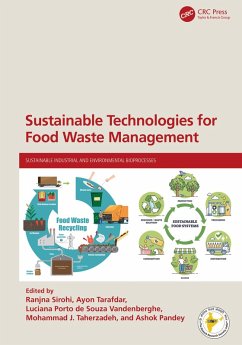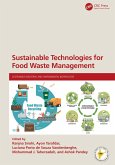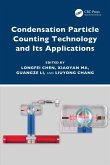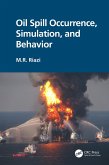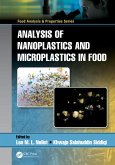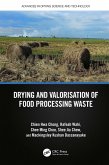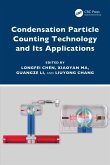Sustainable Technologies for Food Waste Management (eBook, PDF)
Redaktion: Sirohi, Ranjna; Pandey, Ashok; Taherzadeh, Mohammad J.; Vandenberghe, Luciana Porto de Souza; Tarafdar, Ayon
52,95 €
52,95 €
inkl. MwSt.
Sofort per Download lieferbar

26 °P sammeln
52,95 €
Als Download kaufen

52,95 €
inkl. MwSt.
Sofort per Download lieferbar

26 °P sammeln
Jetzt verschenken
Alle Infos zum eBook verschenken
52,95 €
inkl. MwSt.
Sofort per Download lieferbar
Alle Infos zum eBook verschenken

26 °P sammeln
Sustainable Technologies for Food Waste Management (eBook, PDF)
Redaktion: Sirohi, Ranjna; Pandey, Ashok; Taherzadeh, Mohammad J.; Vandenberghe, Luciana Porto de Souza; Tarafdar, Ayon
- Format: PDF
- Merkliste
- Auf die Merkliste
- Bewerten Bewerten
- Teilen
- Produkt teilen
- Produkterinnerung
- Produkterinnerung

Bitte loggen Sie sich zunächst in Ihr Kundenkonto ein oder registrieren Sie sich bei
bücher.de, um das eBook-Abo tolino select nutzen zu können.
Hier können Sie sich einloggen
Hier können Sie sich einloggen
Sie sind bereits eingeloggt. Klicken Sie auf 2. tolino select Abo, um fortzufahren.

Bitte loggen Sie sich zunächst in Ihr Kundenkonto ein oder registrieren Sie sich bei bücher.de, um das eBook-Abo tolino select nutzen zu können.
This comprehensive book explores diverse food waste management aspects, from issue comprehension to innovative and solutions, covering advanced waste characterization methods and conversion techniques. This book is intended for researchers, students, and policymakers tackling the global food waste challenge.
- Geräte: PC
- mit Kopierschutz
- eBook Hilfe
Andere Kunden interessierten sich auch für
![Sustainable Technologies for Food Waste Management (eBook, ePUB) Sustainable Technologies for Food Waste Management (eBook, ePUB)]() Sustainable Technologies for Food Waste Management (eBook, ePUB)52,95 €
Sustainable Technologies for Food Waste Management (eBook, ePUB)52,95 €![Condensation Particle Counting Technology and Its Applications (eBook, PDF) Condensation Particle Counting Technology and Its Applications (eBook, PDF)]() Condensation Particle Counting Technology and Its Applications (eBook, PDF)94,95 €
Condensation Particle Counting Technology and Its Applications (eBook, PDF)94,95 €![Phytoremediation in Food Safety (eBook, PDF) Phytoremediation in Food Safety (eBook, PDF)]() Phytoremediation in Food Safety (eBook, PDF)125,95 €
Phytoremediation in Food Safety (eBook, PDF)125,95 €![Oil Spill Occurrence, Simulation, and Behavior (eBook, PDF) Oil Spill Occurrence, Simulation, and Behavior (eBook, PDF)]() M. R. RiaziOil Spill Occurrence, Simulation, and Behavior (eBook, PDF)54,95 €
M. R. RiaziOil Spill Occurrence, Simulation, and Behavior (eBook, PDF)54,95 €![Analysis of Nanoplastics and Microplastics in Food (eBook, PDF) Analysis of Nanoplastics and Microplastics in Food (eBook, PDF)]() Analysis of Nanoplastics and Microplastics in Food (eBook, PDF)57,95 €
Analysis of Nanoplastics and Microplastics in Food (eBook, PDF)57,95 €![Drying and Valorisation of Food Processing Waste (eBook, PDF) Drying and Valorisation of Food Processing Waste (eBook, PDF)]() Chien Hwa ChongDrying and Valorisation of Food Processing Waste (eBook, PDF)48,95 €
Chien Hwa ChongDrying and Valorisation of Food Processing Waste (eBook, PDF)48,95 €![Condensation Particle Counting Technology and Its Applications (eBook, ePUB) Condensation Particle Counting Technology and Its Applications (eBook, ePUB)]() Condensation Particle Counting Technology and Its Applications (eBook, ePUB)94,95 €
Condensation Particle Counting Technology and Its Applications (eBook, ePUB)94,95 €-
-
-
This comprehensive book explores diverse food waste management aspects, from issue comprehension to innovative and solutions, covering advanced waste characterization methods and conversion techniques. This book is intended for researchers, students, and policymakers tackling the global food waste challenge.
Dieser Download kann aus rechtlichen Gründen nur mit Rechnungsadresse in A, B, BG, CY, CZ, D, DK, EW, E, FIN, F, GR, HR, H, IRL, I, LT, L, LR, M, NL, PL, P, R, S, SLO, SK ausgeliefert werden.
Produktdetails
- Produktdetails
- Verlag: Taylor & Francis eBooks
- Seitenzahl: 278
- Erscheinungstermin: 10. Februar 2025
- Englisch
- ISBN-13: 9781040222652
- Artikelnr.: 72788955
- Verlag: Taylor & Francis eBooks
- Seitenzahl: 278
- Erscheinungstermin: 10. Februar 2025
- Englisch
- ISBN-13: 9781040222652
- Artikelnr.: 72788955
- Herstellerkennzeichnung Die Herstellerinformationen sind derzeit nicht verfügbar.
Dr. Ranjna Sirohi is currently working as an Assistant Professor at the SKN Agricultural University (SKNAU), Jaipur, India. She obtained PhD degree in Process and Food Engineering from G.B. Pant University of Agriculture and Technology, Pantnagar, India. She worked as a Research Professor at Korea University in Seoul, Republic of Korea, and as Assistant Professor in the University of Petroleum and Energy Studies, Dehradun before joining the SKNAU. She has also worked as a researcher at the École Polytechnique Fédérale de Lausanne, Switzerland. Her major research interests are in Bioprocess technology, food and food waste valuation, waste to wealth, and Biofuels. She has more than 150 publications, including seven books, 21 book chapters and popular articles and two patents. Dr. Ayon Tarafdar is currently working as an ARS Scientist at the ICAR-Indian Veterinary Research Institute, Bareilly, India. He obtained his PhD degree from NIFTEM (Kundli, India) in Food Engineering. He has worked at Washington University in St. Louis, USA. His main research focus has been on non-thermal food processing operations, bioprocess modeling and optimization, machine learning, food waste valorization, etc. He has published 93 scientific papers and reviews in addition to thirteen book chapters, two four books, and one filed patent. Dr. Tarafdar has been awarded several fellowships, including the TEQIP-II fellowship, the NIFTEM research fellowship, UGC-JRF fellowship, CSIR SRF, and the DST-SERB-DST international travel grant. Dr. Luciana Porto de Souza Vandenberghe is a Professor at the Department of Bioprocess Engineering and Biotechnology, Federal University of Paraná, Curitiba, Brazil. Dr. Vandenberghe obtained her PhD degree in Génie de Procédés Industriels-Biotechnologie from the Université de Technologie de Compiègne (2000), France. Her areas of interest include Bioprocess engineering and biotechnology and industrial microbiology, with a focus on the valorization of solid and liquid agro-industrial products through submerged and solid-state fermentation for biomolecule production, including biofuels, industrial enzymes, organic acids, bioplastics, and plant growth hormones. She has published 160 papers, five books, 69book chapters, and 28 patents. She is an editor and an editorial board member of various journals. Professor Mohammad J. Taherzadeh has been a Professor of Bioprocess technology since 2004 at the University of Borås in Sweden and Chairman of the Swedish Centre for Resource Recovery. Prof. Taherzadeh has a PhD in Bioscience from Sweden (1999). His research interests are on developing processes to convert wastes and residuals to value-added products, with a focus on pretreatment and fermentation using filamentous fungi and anaerobic bacteria. He has eight patents, more than 500 publications, and eight books. Professor Ashok Pandey is currently Distinguished Scientist at the Centre for Innovation and Translational Research, CSIR-Indian Institute of Toxicology Research, Lucknow, India. His major research and technological development interests are industrial and environmental biotechnology and energy biosciences, focusing on biomass to biofuels and chemicals, waste to wealth and energy, etc. He has 16 patents, 125 books, and more than 1000 papers and book chapters. Professor Pandey is the recipient of many national and international awards and honours, which include Distinguished Fellow, the Biotech Research Society, India; Fellow of five international and four Indian academies, including The World Academy of Sciences (TWAS), World Society for Sustainable Energy Technologies, National Academy of Sciences, India; Indian National Science Academy; Academician of European Academy of Sciences and Arts, etc.
1. Introduction to food waste management.2. Methods for food waste
characterization.3. Thermo-chemical processes for food waste treatment.4.
Biological processes for food waste treatment.5. Production of biohydrogen
from food waste.6. Production of biogas from food waste.7. Production of
biopolymers from food waste.8. Production of organic acids from food
waste.9. Production of compost and vermicompost from food waste.10.
Production of biochar from food waste.11. Bioactive compounds from food
waste.12. Food waste management through machine learning, IoT and
blockchain.
characterization.3. Thermo-chemical processes for food waste treatment.4.
Biological processes for food waste treatment.5. Production of biohydrogen
from food waste.6. Production of biogas from food waste.7. Production of
biopolymers from food waste.8. Production of organic acids from food
waste.9. Production of compost and vermicompost from food waste.10.
Production of biochar from food waste.11. Bioactive compounds from food
waste.12. Food waste management through machine learning, IoT and
blockchain.
1. Introduction to food waste management.2. Methods for food waste
characterization.3. Thermo-chemical processes for food waste treatment.4.
Biological processes for food waste treatment.5. Production of biohydrogen
from food waste.6. Production of biogas from food waste.7. Production of
biopolymers from food waste.8. Production of organic acids from food
waste.9. Production of compost and vermicompost from food waste.10.
Production of biochar from food waste.11. Bioactive compounds from food
waste.12. Food waste management through machine learning, IoT and
blockchain.
characterization.3. Thermo-chemical processes for food waste treatment.4.
Biological processes for food waste treatment.5. Production of biohydrogen
from food waste.6. Production of biogas from food waste.7. Production of
biopolymers from food waste.8. Production of organic acids from food
waste.9. Production of compost and vermicompost from food waste.10.
Production of biochar from food waste.11. Bioactive compounds from food
waste.12. Food waste management through machine learning, IoT and
blockchain.
